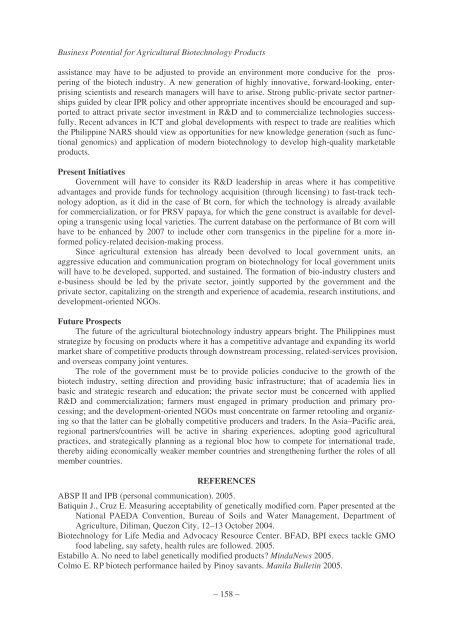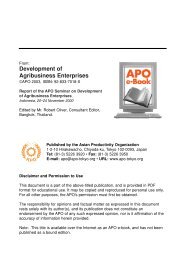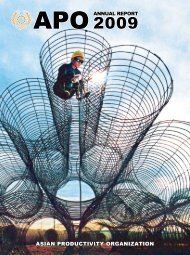Business Potential for Agricultural Biotechnology - Asian Productivity ...
Business Potential for Agricultural Biotechnology - Asian Productivity ...
Business Potential for Agricultural Biotechnology - Asian Productivity ...
You also want an ePaper? Increase the reach of your titles
YUMPU automatically turns print PDFs into web optimized ePapers that Google loves.
<strong>Business</strong> <strong>Potential</strong> <strong>for</strong> <strong>Agricultural</strong> <strong>Biotechnology</strong> Products<br />
assistance may have to be adjusted to provide an environment more conducive <strong>for</strong> the prospering<br />
of the biotech industry. A new generation of highly innovative, <strong>for</strong>ward-looking, enterprising<br />
scientists and research managers will have to arise. Strong public-private sector partnerships<br />
guided by clear IPR policy and other appropriate incentives should be encouraged and supported<br />
to attract private sector investment in R&D and to commercialize technologies successfully.<br />
Recent advances in ICT and global developments with respect to trade are realities which<br />
the Philippine NARS should view as opportunities <strong>for</strong> new knowledge generation (such as functional<br />
genomics) and application of modern biotechnology to develop high-quality marketable<br />
products.<br />
Present Initiatives<br />
Government will have to consider its R&D leadership in areas where it has competitive<br />
advantages and provide funds <strong>for</strong> technology acquisition (through licensing) to fast-track technology<br />
adoption, as it did in the case of Bt corn, <strong>for</strong> which the technology is already available<br />
<strong>for</strong> commercialization, or <strong>for</strong> PRSV papaya, <strong>for</strong> which the gene construct is available <strong>for</strong> developing<br />
a transgenic using local varieties. The current database on the per<strong>for</strong>mance of Bt corn will<br />
have to be enhanced by 2007 to include other corn transgenics in the pipeline <strong>for</strong> a more in<strong>for</strong>med<br />
policy-related decision-making process.<br />
Since agricultural extension has already been devolved to local government units, an<br />
aggressive education and communication program on biotechnology <strong>for</strong> local government units<br />
will have to be developed, supported, and sustained. The <strong>for</strong>mation of bio-industry clusters and<br />
e-business should be led by the private sector, jointly supported by the government and the<br />
private sector, capitalizing on the strength and experience of academia, research institutions, and<br />
development-oriented NGOs.<br />
Future Prospects<br />
The future of the agricultural biotechnology industry appears bright. The Philippines must<br />
strategize by focusing on products where it has a competitive advantage and expanding its world<br />
market share of competitive products through downstream processing, related-services provision,<br />
and overseas company joint ventures.<br />
The role of the government must be to provide policies conducive to the growth of the<br />
biotech industry, setting direction and providing basic infrastructure; that of academia lies in<br />
basic and strategic research and education; the private sector must be concerned with applied<br />
R&D and commercialization; farmers must engaged in primary production and primary processing;<br />
and the development-oriented NGOs must concentrate on farmer retooling and organizing<br />
so that the latter can be globally competitive producers and traders. In the Asia–Pacific area,<br />
regional partners/countries will be active in sharing experiences, adopting good agricultural<br />
practices, and strategically planning as a regional bloc how to compete <strong>for</strong> international trade,<br />
thereby aiding economically weaker member countries and strengthening further the roles of all<br />
member countries.<br />
REFERENCES<br />
ABSP II and IPB (personal communication). 2005.<br />
Batiquin J., Cruz E. Measuring acceptability of genetically modified corn. Paper presented at the<br />
National PAEDA Convention, Bureau of Soils and Water Management, Department of<br />
Agriculture, Diliman, Quezon City, 12–13 October 2004.<br />
<strong>Biotechnology</strong> <strong>for</strong> Life Media and Advocacy Resource Center. BFAD, BPI execs tackle GMO<br />
food labeling, say safety, health rules are followed. 2005.<br />
Estabillo A. No need to label genetically modified products? MindaNews 2005.<br />
Colmo E. RP biotech per<strong>for</strong>mance hailed by Pinoy savants. Manila Bulletin 2005.<br />
– 158 –
















